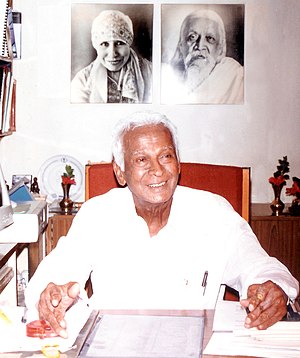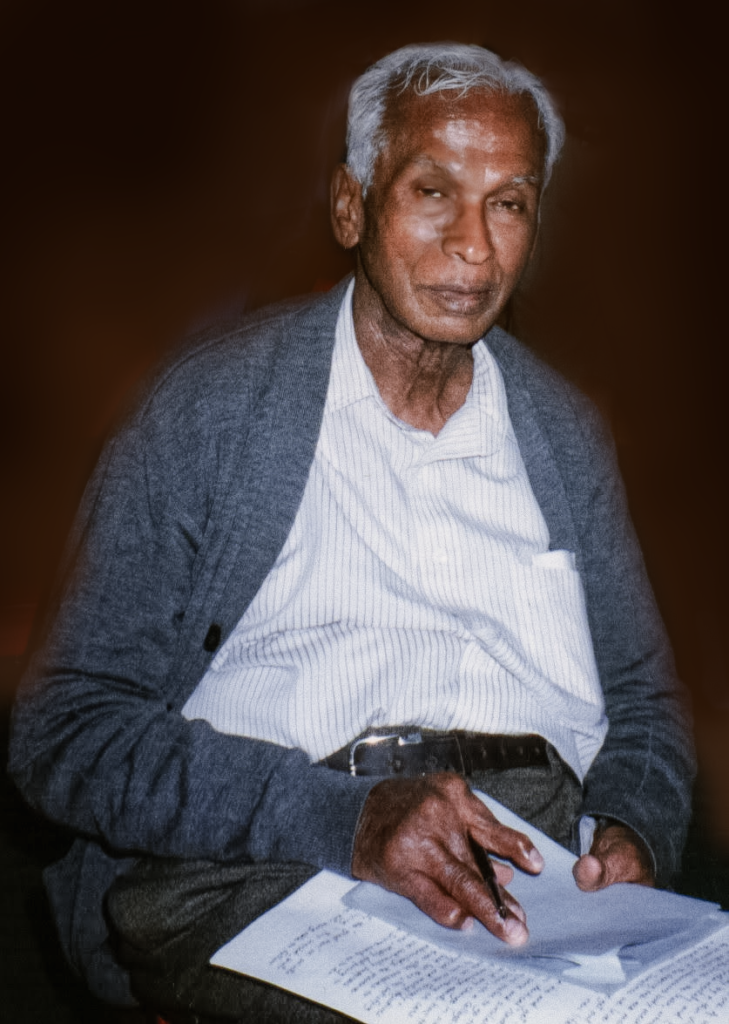
Dr. Govindappa Venkataswamy, known as ‘Dr V.’ was the founder Aravind Eye Hospitals, and a disciple of Sri Aurobindo. In our exploration of outreach health care and blindness prevention in India, Dr. V.’s work was the inspiration for the accomplishments of our guest Aurosugan and his Aurokiya Eye Center.
Dr. V. was a revolutionary in the field of eye care. His mission of eliminating avoidable blindness in rural and underserved populations in India transformed medical care worldwide. He restored vision to hundreds of thousands of people and became the inspiration behind modern medical centers.
Dr. Venkataswamy revolutionized the field of eye care, especially cataract surgery by combining his spiritual aspirations of helping humanity at large with adopting the streamlined production ideas used American in fast food production. He created a workflow platform with the less demanding actions of surgery assigned to technicians or nurses, actions that would previously be performed only by the surgeon. This drastically reduced the time spent on each patient by the surgeon and allowed them to perform only specialized procedures quickly and with rapid patient turnover. This allowed a significant increase of the number of patients treated during each shift and allowed advanced eye care to finally reach underserved groups.
Transforming eye surgery
He was born on October 1, 1918 in Vadamalapuram, a village eighty kilometres from Madurai in Tamil Nadu, India.
He received his medical degree from Stanley Medical College, Chennai in 1944. Soon after finishing school he joined the Indian Army Medical Corps but had to retire in 1948 after developing rheumatoid arthritis. He returned to medical school and earned his diploma and master’s degree in Ophthalmology. Despite dexterity problems due to the arthritis, Dr. V. learned how to hold a scalpel and perform cataract surgery. Eventually, he was able to perform more than one hundred surgeries a day and over one hundred thousand successful eye surgeries during his lifetime. We can speculate that the challenges of rheumatoid arthritis triggered his search for innovative eye surgery techniques.
Meeting Sri Aurobindo, the spiritual inspiration behind Aravind Hospital
In 1950 Dr. V met Sri Aurobindo – a poet, philosopher, and sage. He was influenced deeply by him. Driven by the compassionate urge of his heart to eliminate needless blindness and inspired by the spiritual vision of Sri Aurobindo, Dr. V. set in motion a 30-year old, and still continuing, crusade against blindness – Aravind Eye Care System.
Dr. V.’s spiritual inspiration is reflected in statements form his diary:“I ask God that I be a better tool, a receptacle for the divine force.”
Dr. V. was primarily a yogi who happens to be a doctor and a social entrepreneur. He wrote in his diary:
“I have been doing yoga since 1936, from the age of 18 years consciously or unconsciously.” Behind the moral and social vision of eradicating blindness, Dr. V. has a spiritual vision based on Sri Aurobindo’s teachings.
Bridging spirituality and entrepreneurship
At the age of 55, Dr. V. first saw the golden arches of McDonald’s. That was the beginning of his dream to give eyesight to millions. He reasoned when McDonald’s could sell billions of low-cost burgers, he could also sell millions of low-cost sight restoring operations. In 1976, Dr. V. started Aravind Eye Hospital after mortgaging his house. It had 12 beds then. By the end of 2003, this hospital was offering ultra-modern facilities and 3000 beds.
While in the government service, Dr. V. introduced a number of innovative programmes to deal with the problem of blindness in India. To name a few, outreach camps in eye care (1960), a rehabilitation centre for the blind (1966), and the creation of an ophthalmic assistants training programme in 1973. In recognition of his work in the fight against blindness, Dr. V. received the Padmashree award in 1973 by the Government of India.
Upon his retirement from government service, Dr. V founded Aravind Eye Hospital as an 11-bed facility in 1976. He passed away on July 7, 2006.
The Vision Revolution – Dr. Govindappa Venkataswamy aka Dr. V, creator of Aravind Hospital
by Julian Lines

Govindappa Venkataswamy must be the only disciple of Sri Aurobindo and Mother who was revered by both Wavy Gravy and the Wall Street Journal.
His Aravind Eye Hospital, founded in his own home in Madurai after his retirement from Government service, revolutionized cataract surgery. It was a true sliding scale where by implementing the mass production methods of Henry Ford and McDonald’s burger chain, yet maintaining the quality and high standards, he could offer free operations to the most poor while being subsidized by the more wealthy. His model was replicated by Ram Dass, Wavy Gravy and Dr. Larry Brilliant in SEVA, a nonprofit which raised funds for eye care in Central America and Nepal.
The Bay Area bands, including members of the Grateful Dead and Jefferson Airplane along with Jackson Browne and Bonnie Raitt did numerous benefits over the years for SEVA.
The last of the Aravind Hospitals was built on the outskirts of Pondicherry with a satellite office in Auroville. He also started manufacturing intraocular lenses and equipment so that the gift of sight could be more affordable around the world.
Aurosugan began his career at this final hospital created by Dr. V. He speaks fondly and with reverence about the continued influence of Dr. V in the everyday life of the hospital.
"Dr. V imparted a strong sense of spiritual purpose and ethical conduct that continues to this day. For example, punctuality. It is not just that punctuality is important to all the staff, but everyone sees punctuality as part of a larger sense of spiritual conduct at the hospital."
